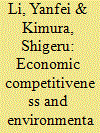|
|
|
Sort Order |
|
|
|
Items / Page
|
|
|
|
|
|
|
| Srl | Item |
| 1 |
ID:
176125


|
|
|
|
|
| Summary/Abstract |
Hydrogen as an energy carrier faces challenges such as high costs of hydrogen supply, high cost of fuel cell electric vehicles (FCEVs), and substantial infrastructure requirements. However, leading countries have announced long-term plan and targets in developing hydrogen energy. Should the Association of Southeast Asian Nations (ASEAN) follow up such developments? This study asks if hydrogen-based road transport, especially FCEVs in the fleets of passenger cars, buses, and trucks, could be economically justified in the ASEAN member states. If not, what strategies to take for ASEAN member states? The study applies a well-to-wheel model and a total cost of ownership model to compare the energy consumption, carbon emissions, as well as the costs of FCEVs with those of alternative powertrains. This practice shows the scale of the cost gaps. Subsequently, it estimates the implications of predicted future developments of both hydrogen and FCEVs, in terms of costs and carbon emissions reduced. The results indicate the areas in which FCEVs are most likely to become competitive in the near future, and thus could be targeted and prioritised. By comparing the country-specific results, implications are extended to what policies are most relevant in facilitating the development of hydrogen and fuel cell.
|
|
|
|
|
|
|
|
|
|
|
|
|
|
|
|
| 2 |
ID:
183078


|
|
|
|
|
| Summary/Abstract |
In September 2020, the Chinese central government announced a new policy to develop hydrogen energy and fuel cell applications. It emphasized fuel cell commercial vehicles rather than passenger vehicles. Such an emphasis is drastically different from the hydrogen and fuel cell strategies of other leading economies. This study aims at providing insights into the justification behind it. It develops quantitative models to conduct economic assessments of the feasibility of hydrogen energy produced from renewable energy and subsequently applied in the road transport sector in China. A well-to-wheel model is developed to estimate the carbon emissions of the hydrogen supply chain as well as that of the fuel cell electric vehicles. In the meantime, a levelised cost of hydrogen model is adopted to analyze the cost of hydrogen as storage for renewable energy. These are followed by a total cost of ownership model applied to assess the cost of owning and driving fuel cell electric vehicle, fueled by the hydrogen produced from renewables, compared to alternative vehicle powertrains, especially those fossil fuel-based. On such a basis, the relation between energy policies and the competitiveness of hydrogen produced from renewable energy and the fuel cell electric vehicle is discussed.
|
|
|
|
|
|
|
|
|
|
|
|
|
|
|
|
| 3 |
ID:
150699


|
|
|
| 4 |
ID:
166572


|
|
|
|
|
| Summary/Abstract |
Electrification of road transport (or electric mobility) has progressed beyond the demonstration stage, with many Association of Southeast Asian Nations (ASEAN) members increasingly interested in it. This study starts with a survey of all ASEAN countries' vehicle fleets, fuel consumption and share, fuel mix in power generation, among others. The potential of electrifying fleets, including passenger vehicles, buses, and trucks – the main consumers of fossil fuel in road transport – is estimated in 2040 scenarios. How electric mobility enhances energy security is assessed using the 4A framework: availability, applicability, acceptability, and affordability of energy. The findings reveal intensive interaction of electrification of road transport with the introduction of higher fuel economy standards and higher integration of renewable energy into the power sector.
|
|
|
|
|
|
|
|
|
|
|
|
|
|
|
|
|
|
|
|
|